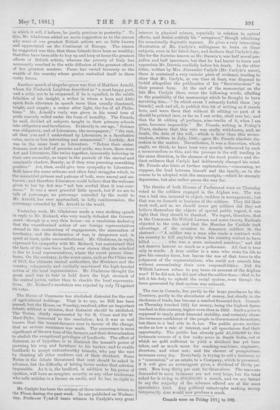Another speech of singular grace was that of Matthew Arnold,
whom Sir Frederick Leighton described as "a most happy poet, and a critic not to be surpassed, if ho is equalled, iu the subtle felicities of his insight, a writer in whom a keen and Attic spirit finds utterance in speech more than usually chastened, bright, and supple ; a seeker after light, the foe of all Philis- tines." Mr. Arnold's reply was given in his usual tone of pride scarcely veiled under the form of humility. The French, he said, divided all subjects taught in their primary schools into obligatory and facultative. Evidently in our age, " Science was obligatory, and of Literature, the newspapers ;" " the rest, all that you and I understand by Literature, is a facultative extra, more or 'less interesting and ornamental." Luckily, Art was in the same boat as Literature. " Before their sister, Science, now so full of promise and pride, was born, there were Art and Literature, like twins together, innocently believing in their own necessity, as eager iu the pursuit of the eternal and unseizable shadow, Beauty, as if they were pursuing something positive." Art, then, could give true sympathy to Literature. Both knew the same arduous and often fatal struggles which, to the assembled princes and patrons of both, were unreal and un- known ; and therefore Literature could believe that the welcome given to her by Art was " not less cordial than it was cour- teous." It was a most graceful little speech, but if we are to talk of patronage, no patronage extended by the world to Mr. Arnold, has ever approached, in lofty condescension, the patronage extended by Mr. Arnold to the world.


































 Previous page
Previous page